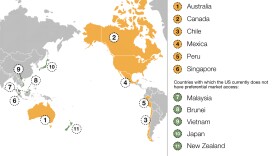By Richard Nelson
http://stream.publicbroadcasting.net/production/mp3/wkms/local-wkms-936769.mp3
Murray, KY – For many, Thanksgiving has become a tradition of gathering around a turkey with the family, sharing stories and giving thanks. Commentator Richard Nelson recently found some statistics on opinions about marriage and the traditional family, which suggest that the idea of family has changed in people's minds. Nelson found, however that most Americans still believe children fare best in two-parent families.
A new survey by the Pew Research Center and TIME called The Decline of Marriage And Rise of New Families is certain to ruffle a few feathers especially as families gather around Thanksgiving Day tables this Thursday. In it, researchers find that 39 percent of Americans believe that marriage is obsolete, but before social engineers declare this turkey cooked, they ought to take a second look.
Buried in the 108-page study are encouraging morsels to those who still believe in the traditional family. Sixty-nine percent of Americans still believe that out-of-wedlock births are a bad thing; 61 percent say that a child needs both a mother and a father to grow up happily; and 58 percent say that marriage is not obsolete. Please pass the gravy.
Yet the idea that marriage is obsolete is capturing the headlines and has marriage deconstructionists as giddy as children on Christmas morning. But before they stick a fork in it, they ought to ask their three compatriots who used to sit on the Iowa Supreme Court about the wisdom of legislating traditional marriage into obsolescence. Of course, Iowa voters unelected them on Nov. 2.
This isn't the first time in our history that marriage was thought unnecessary. In the 1960's, no-fault divorce laws swept through state legislatures and paved the way for the divorce boom of the 1970's. Children, the biggest losers in this societal bargain that promised to eliminate acrimonious divorce proceedings, still suffer from the fallout and emotional trauma from divorce. Marriage wasn't obsolete for them. Nor is it to the children growing up in single-parent homes who yearn for a mother or father. As it is, 41 percent of all children today are born out of wedlock, up from 5 percent in 1960.
The question du jour? Is marriage the bulwark to society or is it just like another ornament that will adorn our Thanksgiving tables this Thursday? Marriages are not as durable as they once were, but just because many marriages aren't surviving thanks to easy divorce and a culture that scoffs at commitment, doesn't mean the entire institution should be scuttled. When the two parts of humanity are joined together in a lifelong covenant, it brings untold benefits to themselves, their offspring and society at large.
Married people live longer and are healthier and happier than their unmarried peers. They earn more and are less likely to abuse drugs or alcohol and receive public assistance. According to marriage expert Mike McManus, "the primary cause of poverty is not joblessness but marriage, or rather, marriage absence." In September, The Heritage Foundation published the report "Marriage: America's No. 1 Weapon Against Childhood Poverty," and found that the probability of child poverty declines by 82 percent when they live with both parents who are married. According to 2008 statistics, only 6.4 percent of married, two-parent families are poor compared with 36.5 percent of families headed by a single mother. The proof is in the pudding: marriage is a key ingredient to family financial stability.
Indeed, marriage is more than just a tool to fight poverty or part of an economic calculation toward prosperity. It is an absolutely crucial social arrangement that civilization depends upon and it's an institution that our children need to thrive, whether we admit it or not. We should no more give our children homes without marriage than we would give them a Thanksgiving without a turkey.
Fodder for discussion around the dinner table for sure. Let's hope it doesn't cause much heartburn.
Richard Nelson is a policy analyst for The Family Foundation, a non-profit public policy organization. He currently resides in Trigg County with his family.






